
Ogbomosho is a city in Oyo State, south-western Nigeria. It was founded in the mid 17th century. The population was approximately 655,517 in 2024. It is the second largest city in Oyo State and also among the most populated in Nigeria. It is the 3rd most populated city in South Western Nigeria after Lagos and Ibadan. Although the principal inhabitants of the city are the Yoruba people, there are people from other parts of Nigeria and other West African countries who are residents in the city.

The Oyo Empire was a Yoruba empire in West Africa. It was located in present-day southern Benin and western Nigeria. The empire grew to become the largest Yoruba-speaking state through the organizational and administrative efforts of the Yoruba people, trade, as well as the military use of cavalry. The Oyo Empire was one of the most politically important states in Western Africa from the mid-17th to the late 18th century and held sway not only over most of the other kingdoms in Yorubaland, but also over nearby African states, notably the Fon Kingdom of Dahomey in the modern Republic of Benin on its west.
Abiodun was an 18th-century alaafin, or king, of the Oyo people in what is now Nigeria.

Alaafin, or The custodian of the Palace in the Yoruba language, is the title of the king of the medieval Oyo empire and present-day Oyo town of West Africa. It is the particular title of the Oba (king) of the Oyo. It is sometimes translated as "emperor" in the context of ruler of empire. He ruled the old Oyo Empire, which extended from the present-day Benin republic to Nigeria, originating from states in the South East and West to the North. The people under him are called Yoruba people and spoke the Yoruba Language.

The Legends of Africa reflect a wide-ranging series of kings, queens, chiefs and other leaders from across the African continent including Mali, Benin, Ghana, Nigeria, Congo, Ethiopia, Eritrea and South Africa.
Oba means "ruler" in the Yoruba and Bini languages. Kings in Yorubaland, a region which is in the modern republics of Benin, Nigeria and Togo, make use of it as a pre-nominal honorific. Examples of Yoruba bearers include Oba Ogunwusi of Ile-Ife, Oba Aladelusi of Akure, and Oba Akiolu of Lagos. An example of a Bini bearer is Oba Ewuare II of Benin.
Aganju of Oyo was a Yoruba emperor of the Oyo state, in present-day Nigeria. He was said to have been the fourth Alaafin or old Oyo.
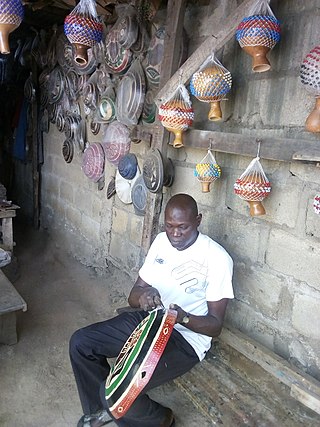
Oyo is a city in Oyo State, Nigeria. It was founded as the capital of the remnant of the historic Oyo empire in the 1830s, and is known to its people as 'New Oyo' to distinguish it from the former capital to the north, 'Old Oyo' (Ọ̀yọ́-Ilé), which had been deserted as a result of the Yoruba Revolutionary Wars. Its inhabitants are mostly of the Yoruba people, and its ruler is the Alaafin of Oyo.
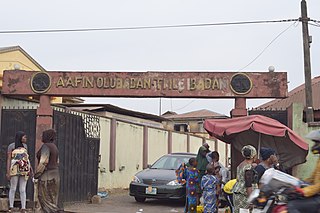
Olubadan is the royal title of the king of Ibadanland in Nigeria. Ibadan was founded in the 16th century, but the present Yoruba people only took control around 1820. By 1850, they had established their unusual succession principle, which is quite different compared with other traditional Yoruba rulers in that it alternates between two lines. It usually takes decades to groom an Olubadan for the stool through stages of chieftaincy promotion, thus meaning that just about any male born title-holder of the metropolitan centre is a potential king.
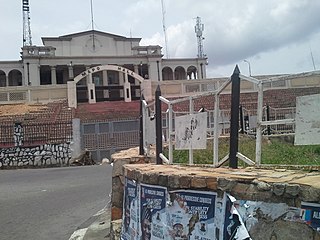
Mapo Hall is the colonial-style Ibadan City Hall on top of Mapo Hill in Ibadan, Oyo State, Nigeria. Mapo Hall was commissioned during the colonial era by Captain Ross in 1929.
Chinyere Ike Nwosu was a Nigerian Military Administrator of Abia State and then of Oyo State during the military regime of General Sani Abacha.
Gbongan is a large town in Osun State, Nigeria. It is the headquarters of the Aiyedaade Local Government Area.
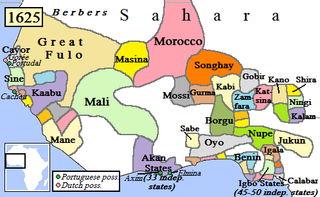
Nigerian traditional rulers often derive their titles from the rulers of independent states or communities that existed before the formation of modern Nigeria. Although they do not have formal political power, in many cases they continue to command respect from their people and have considerable influence in their community.
Sir Kofoworola Adekunle "Kofo" Abayomi, KBE was a Nigerian ophthalmologist and politician. He was one of the founders of the nationalist Nigerian Youth Movement in 1934 and went on to have a distinguished public service career. His last major public assignment was as chairman of the Lagos Executive Development Board from 1958 until 1966.
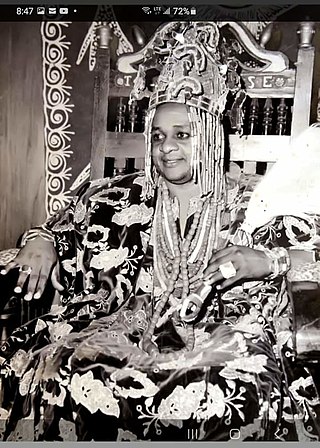
Lamidi Olayiwola Adeyemi III was the Alaafin, or traditional ruler, of the Yoruba town of Oyo and rightful heir to the throne of its historic empire.
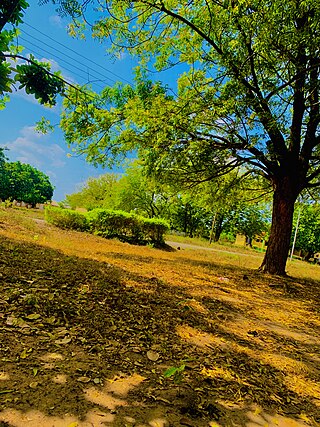
Eruwa (Yoruba: Èrúwà or fully meaning 'pieces of yam are available here' is a town and the headquarters of Ibarapa East Local Government Area in south-western Nigeria located in Oyo state. Eruwa is 72 km south west of Ibadan and 60 km north east of Abeokuta.

The Ekiti people are one of the largest historical subgroups of the larger Yoruba people of West Africa, located in Nigeria. They are classified as a Central Yoruba group, alongside the Ijesha, Igbomina, Yagba and Ifes. Ekiti State is populated exclusively by Ekiti people; however, it is but a segment of the historic territorial domain of Ekiti-speaking groups, which historically included towns in Ondo State such as Akure, Ilara-Mokin, Ijare, and Igbara-oke. Ogbagi, Irun, Ese, Oyin, Igasi, Afin and Eriti in the Akoko region, as well as some towns in Kwara State, are also culturally Ekiti, although belong in other states today.
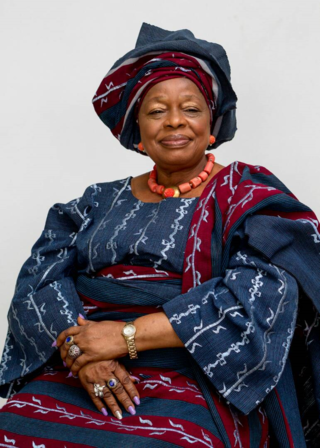
The Ìyálóde is a high-ranking female chieftain in most of the Yoruba traditional states. The title is currently within the gift of the obas, although Njoku asserted in 2002 that the process of choosing an Ìyálóde in pre-colonial Nigeria was less of a choice by the monarch, and more of the accomplishment and involvement of the woman to be so honoured in economic and political matters.
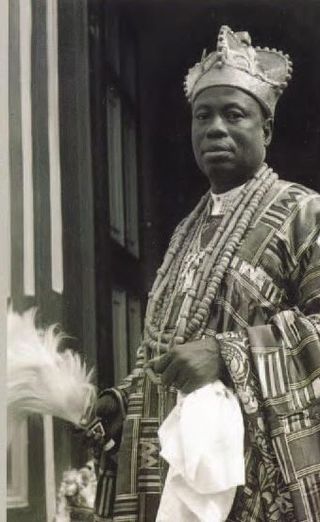
The Nigerian Chieftaincy is the chieftaincy system that is native to Nigeria. Consisting of everything from the country's monarchs to its titled family elders, the chieftaincy as a whole is one of the oldest continuously existing institutions in Nigeria and is legally recognized by its government.













